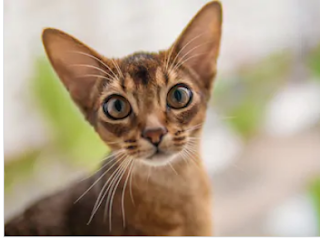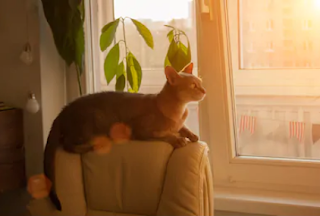Weight range:
Male: medium: 18-12 lbs |
| Cat Breed information |
Eye color: Green, Gold
Coat:
Length: Short, Medium.
Characteristics: Silky, Smooth
Colors: Ruddy, Red, Blue, Fawn, Cinnamon
Pattern: Ticking
Less Allergenic: No
Overall Grooming Needs: Low
Expectations:
Longevity Range: 9-13 Years
Social/Attention Needs: High
Tendency to Shed: Low
According to many peoples, Abyssinian is an ancient breed. This beautiful creature resembles the small African wildcat. The size of Abyssinian is neither very small nor very huge. The look of the Abyssinian is very moderate. This beauty has small planes on her head. Her head looks triangular with a gentle dip in it.
Abyssinian has huge ears. She looks very alert because of these ears. She looks too much aware as if she is paying attention to everything going on around her. Her big eyes also represent her intelligence and alertness. She is also known as Aby.
Personality
 |
| Abyssinian |
The nature of Aby is very loving and affectionate towards others. They also like to spend time with their parents. Abyssinian is pretty comfortable with a person of any age group. She always needs someone to spend a pleasant time with her. It is not so difficult to train this kitty because of her exceptional brainpower and intelligence.
Living with Abyssinian
Aby is a very active breed, so they like to jump here and there. She remains fit because of these jumping exercises. As a result, her weight remains under control with compensating exercises. Abyssinian should have some high perches and trees for climbing and jumping purposes.The nature of this kitten is very Social. This kitty enjoys having the company of other animals. In the absence of humans, these cats need the company of other kittens and animals.
History
While the Aby is considered to be the breed whose roots may be connected to the Nile valley, she was developed in Great Britain. Lord Robert Napier brought a kitty to Britain. At that time he was following a military expedition to Abyssinia and named her Zulu. |
| Social kitten |
In Europe, Canada, and the United States, This kitty was very famous. In Europe, this kitten was almost abolished because of two world wars; only a few cats remained. Finally, new kittens were imported to tackle this situation. This is an excellent example of this kitten's popularity in Europe.
Grooming
To remove dead hair from Abyssinian's short coat, groom her weekly with a stainless steel comb. As a result, her coat will remain shiny and beautiful. Similarly, trim her nails usually every 10 to 14 days. Brush her teeth as needed. Brushing is essential because she can develop periodontal disease. For this brushing purpose, you can use a vet-approved pet toothpaste. You should maintain her hygiene.Health
Abyssinian can develop an unhealthy condition called pyruvate kinase deficiency caused by a recessive gene. Pyruvate kinase is a vital enzyme for energy metabolism in RBCs. The gene pool through DNA screening is a secure method to remove this. The test can determine if any Abyssinian kitten is suffering from deficiency or not.This deficiency is a hereditary problem that can affect both the youngest and oldest kittens. It is not compulsory that every PK-deficient cat develops clinical signs. Some examples of these signs are lethargy, pale gums, and an enlarged abdomen. The best treatment is unknown to cure PK deficiency. It is a good idea to test your kitten regularly after a definite interval.










Please comment for any querry
ReplyDelete